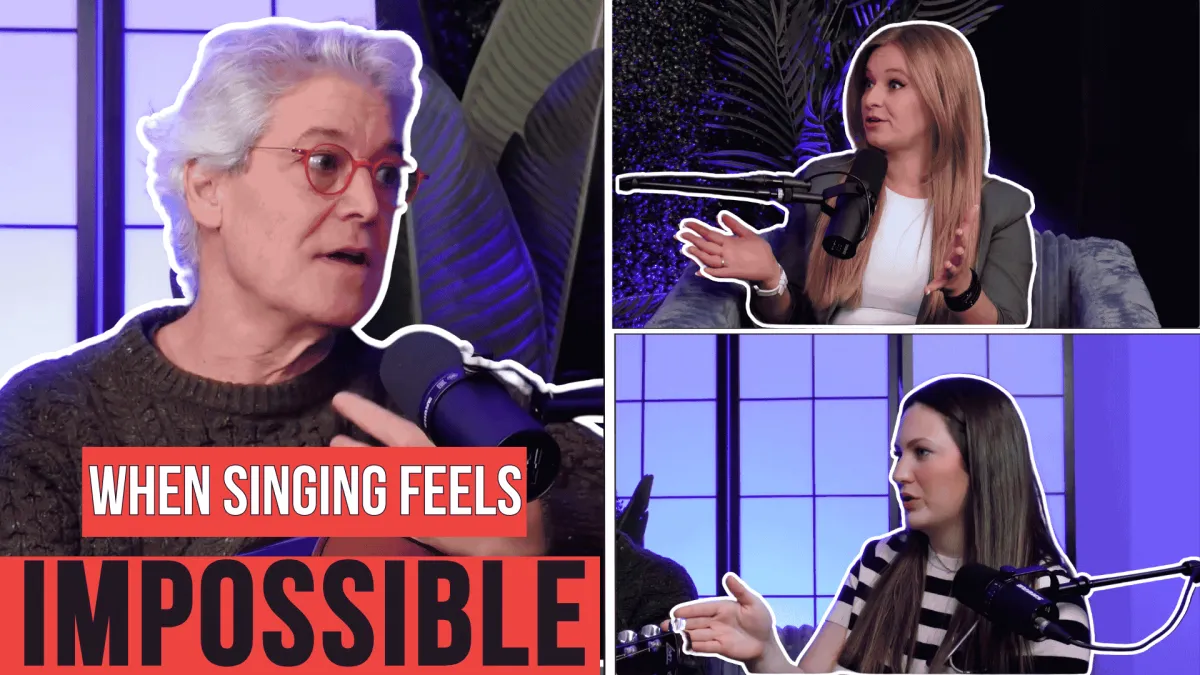
From Fighting Your Voice To Exploring It With VTS Student Michael Graetzer
Real Coaching for the Hardest Part of Your Voice
Every singer has that one part of their voice that feels harder than the rest.
For Michael, it wasn’t the super high notes or low ones—it was the middle. After years of experience (including time at Berklee and countless of songs written), he came to Coach Emily with one goal:
“How do I get this part of my voice to work consistently?”
In this episode of From Singer to Artist, we sat down to talk about the struggles, frustrations, and breakthroughs that come with singing through the most challenging part of your voice—and how to stop powering through and start actually solving the problem.
Scroll down to the bottom of the page to watch/listen to the podcast on Spotify, Apple Podcast or YouTube
The Struggle No One Talks About
🎙 Lara: “There’s no glamour in struggling through something.”
When you’re stuck on one specific thing—especially something that feels small—it’s incredibly frustrating. But for some reason we then become obsessed with that part of the voice, so we spend all of our time there. If you’re working on something hard, it doesn’t mean you’re behind. It means you’re paying attention—and that’s where real progress starts.
On the other hand, you don’t have to stay there all the time… You’re allowed and encouraged to explore the parts of your voice that come more easily and naturally to you too - especially when it comes to songs you’re planning on performing!
Remember, you always want to put your best foot forward when performing. It’s ok to work on songs when you practice and never perform them. Use difficult songs to practice and easier songs to perform. You’ll feel much less nervous/anxious when you perform and your audience will also have a better time because of that. Win - win!

Learning to Explore Your Voice (Instead of Fixing It)
🎙 Emily: Explore every little weird sound your voice can make. That’s how you start walking over that bridge from singer to artist.
You don’t need to power through. You needed to get curious. This curiosity and exploration also helps take the pressure off of you and the need of sounding perfect lessens, which in return leads to more progress more quickly.
One of my favorite things coach Emily says is “it’s not that deep”. Don’t take yourself and singing so seriously. Remember why you started in the first place - because it was fun and a way to express yourself. Don’t get lost in perfection and the “shoulds” of singing.
💡 Coaching Tip: Exploration leads to awareness. Awareness leads to progress.
Don’t rush to fix. Ask questions instead. Where is the tension? What’s changing in your breath or mouth shape? What’s different about this note compared to the last? Making one micro adjustment at a time is often what will lead to your breakthrough, not one major change.
Highlight Your Strengths Over Challenges
What can we do to get around our weak spot? It’s a question almost every singer has thought—but never wants to say out loud.
🎙 Emily: “Don’t let the song sing you”
I always say that song choice will make or break you. Picking a song that fits your voice well and that you love is half the battle. You can always adjust the key of a song to really mold it to your voice.
🎙 Lara: Make the song fit your voice, not your voice fit the song.
But sometimes you can’t pick the song you have to sing, you’re not allowed to change the key of it (stupid, but it happens) or the over all song is perfect for you, there’s just that one spot you seem to always struggle with. We obviously need to have a solution for situations like these.
This is where you can let your artistry come through. Is the note too high for your to belt and you’re worried that if you tried that on stage/in the studio you’d crack? No one said you have to belt that note! Switch it into a breathy head voice instead and create this big contrast no one expects. To the audience it will sound interesting and different and for you it’ll be a lot easier to sing. Instead of focusing on the parts that feel hard, focus on what does feel strong. Bring attention there. Build your phrasing and arrangement around it.
💡 Coaching Tip: Use your best moments to anchor the performance. Plan your emotional peaks, dynamic shifts, and phrasing around what you do best.
Final Takeaway
Your weak spot doesn’t mean you’re a weak singer.
The most frustrating part of your voice is often where the most growth is waiting.
This is a reminder that:
Progress doesn’t always look impressive
Repeating the same exercise won’t help unless you’re listening while you do it
Many micro adjustments will lead to the result you’re looking for, not one huge change
Your voice doesn’t need to be perfect—just responsive
Check out Michael’s website here: https://asongjustforyou.com/
Listen to his music here: https://open.spotify.com/artist/1d2zZq5n1o2BofGZKz5T6d?si=xxOpfjRYSquc9L9o_KfTZA
Prefer Listening To The Podcast On Your Favorite Platform? Listen Below.


